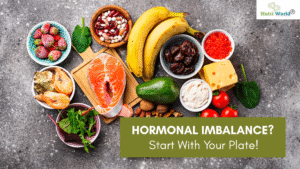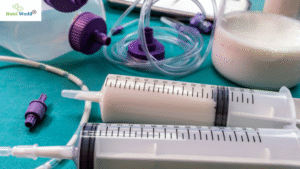By Nutriworld | Dt. Dipanwita Saha
Women’s bodies go through incredible transformations throughout life—puberty, pregnancy, menopause, and beyond. Each life stage demands unique nutritional needs to support hormonal balance, bone health, fertility, and overall well-being. Whether you’re in your 20s focusing on energy and skin health or navigating menopause with a focus on bone density and heart health, targeted nutrition is your most powerful ally.

Why Women’s Nutrition Needs Change Over Time
Unlike men, women’s bodies are heavily influenced by hormonal cycles—from menstruation to menopause. These shifts affect metabolism, energy levels, bone density, heart health, and more. Nutritional needs change not only due to age but also because of key physiological milestones.
The most critical nutrients for women include:
- Iron
- Calcium
- Vitamin D
- Folate
- Protein
- Omega-3 fatty acids
- Magnesium
- Antioxidants
Let’s break it down by life stage.
1. Adolescence (Ages 10–19): Building the Foundation
Key Focus:
Growth, bone development, and menstrual health
During puberty, rapid physical development increases the need for calories and nutrients. Iron becomes crucial as menstruation begins, and calcium supports the surge in bone mass.
Top Nutrients:
- Iron: Prevents anemia; supports new red blood cell production.
- Calcium & Vitamin D: Strengthen bones and prevent early-onset osteoporosis.
- Protein: Builds lean muscle and supports growth.
- Zinc & B Vitamins: Aid in skin health and hormonal balance.
Recommended Foods:
Leafy greens, fortified cereals, dairy or plant-based alternatives, eggs, nuts, and seeds.
2. Reproductive Years (Ages 20–40): Fertility & Energy
Key Focus:
Hormonal balance, reproductive health, and energy maintenance
This stage often involves menstruation, contraception, and potential pregnancy. Balanced nutrition can reduce PMS symptoms, support fertility, and ensure a healthy pregnancy if applicable.
Top Nutrients:
- Folate (Folic Acid): Critical for fetal development—recommended even before conception.
- Iron: To replenish monthly menstrual losses.
- Omega-3s: Support mood and hormonal balance.
Antioxidants (Vitamins C & E): Combat oxidative stress from pollution, stress, and aging.
Recommended Foods:
Berries, whole grains, oily fish, lean meats, legumes, dark chocolate, avocados, and flaxseeds.
3. Pregnancy & Postpartum
Key Focus:
Supporting fetal development, maternal health, and postpartum recovery
A woman’s nutritional needs skyrocket during pregnancy. Macronutrients and micronutrients fuel the baby’s development while maintaining the mother’s strength.
Top Nutrients:
- Folate: Reduces the risk of neural tube defects.
- Iron: Increases blood supply to support mother and baby.
- Calcium: Supports fetal bone development.
- Protein: Critical for tissue growth.
- Choline: Supports brain development.
- Iodine: Crucial for thyroid health and fetal brain development.
Recommended Foods:
Lentils, leafy greens, bananas, dairy, fortified whole grains, and prenatal supplements under medical supervision.
Postpartum Focus:
- Hydration and iron-rich foods to replenish blood loss
- Omega-3s (especially DHA) for mood and cognitive support
4. Perimenopause & Menopause (Ages 40–60): Transition & Protection
Key Focus:
Bone health, metabolism, and heart health
Declining estrogen levels increase the risk of osteoporosis and heart disease. Hot flashes, mood swings, and slower metabolism are common.
Top Nutrients:
- Calcium & Vitamin D: Essential for bone preservation.
- Magnesium: Supports sleep and stress management.
- Phytoestrogens (from soy, flax): May ease menopausal symptoms.
- Fiber: Reduces cholesterol and supports weight management.
Recommended Foods:
Tofu, flaxseeds, broccoli, almonds, oats, and yogurt. Limit added sugars and refined carbs.
5. Senior Years (60+): Aging Gracefully
Key Focus:
Preventing muscle loss, supporting cognition, and boosting immunity
With age, women may experience reduced appetite, decreased muscle mass, and slower digestion. Nutrient-dense, easy-to-digest foods become vital.
Top Nutrients:
- Protein: To preserve muscle and strength.
- B12: Absorption decreases with age; supports brain and nerve function.
- Calcium & Vitamin D: Prevents fractures.
- Omega-3s: Protects against cognitive decline and inflammation.
Recommended Foods:
Soft proteins like eggs and yogurt, fortified cereals, chia seeds, fatty fish, and colorful fruits and vegetables.
Frequently Asked Questions (FAQs)
Q1. Should women take supplements for nutrition?
A: While food should always be the primary source, supplements can be helpful during pregnancy, menopause, or for specific deficiencies (like B12, iron, or Vitamin D). Always consult a healthcare provider before starting any supplement.
Q2. How much protein do women really need?
A: It depends on age, activity level, and life stage. On average:
- Sedentary women: 0.8g/kg body weight
- Active women or during pregnancy/lactation: 1.2–1.5g/kg
Q3. What foods help balance hormones naturally?
A: Omega-3-rich foods (flaxseeds, walnuts, salmon), fiber-rich foods (beans, broccoli), and phytoestrogens (soy, tofu) help regulate estrogen and support hormonal balance.
Q4. Can diet help with PMS and menstrual cramps?
A: Yes. Magnesium, B vitamins, and Omega-3s reduce cramps and mood swings. Limit caffeine, sugar, and processed foods.
Q5. Is dairy necessary for calcium intake?
A: Not necessarily. Plant-based sources like almonds, tofu, fortified plant milks, sesame seeds, and leafy greens provide good amounts of calcium.
Conclusion: Empowerment Through Nutrition
Every woman deserves to feel strong, healthy, and vibrant through every stage of life. With the right nutrition, women can optimize their health, boost resilience, and reduce the risk of chronic diseases. It’s never too early—or too late—to start nourishing your body with intention.
Whether you’re a teenager, a mother, or gracefully aging, remember: your health is your power, and nutrition is your daily act of self-care.

Hello! I'm Dietician Dipanwita Saha is the founder of Nutriworld and a dedicated clinical dietitian. I focus on helping individuals improve their health through personalized diet plans that are based on scientific principles. I believes that proper nutrition is crucial for healing and maintaining a balanced lifestyle, whether someone is recovering from an illness or managing a health condition
Explore Our Courses:
Subscribe to my YouTube channel for more practical diet tips, healthy recipes, and expert insights. I regularly upload videos to simplify nutrition and help you make informed food choices.





